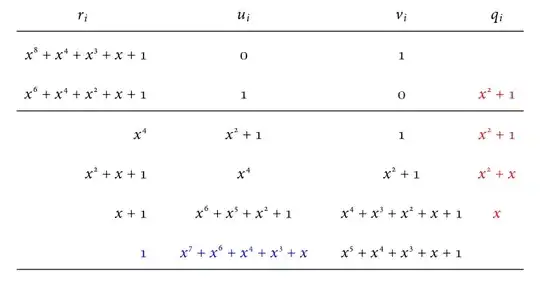I want to invert matrix $A$ in the finite field $\mathbb{F} = \mathbb{F}_2[x]/p(x)\mathbb{F}_2$ with $p(x)=x^8+x^4+x^3+x+1$. This finite field is used by the encryption scheme AES.
$A = \begin{pmatrix} x^6+x^4+x^2+x+1 & x^5+x^3+1 & x^5+x^2+1 \\ x^7+x^4+x & x^4+x & x^2+1 \\ x^6+x^4+x^3+1 & x^6+x^3+x & x^4+x^3 \end{pmatrix} $
For inverting $A$ I am supposed to use the Gaussian algorithm. The first step would be to divide the first row by its first entry, i.e. $x^6+x^4+x^2+x+1$.
How do I find the solution of such divisions, for example $(x^5+x^3+1)/(x^6+x^4+x^2+x+1)$. The finite field contains $2^8$ elements. Hence it is impossible for me to first calculate the multiplication table.
